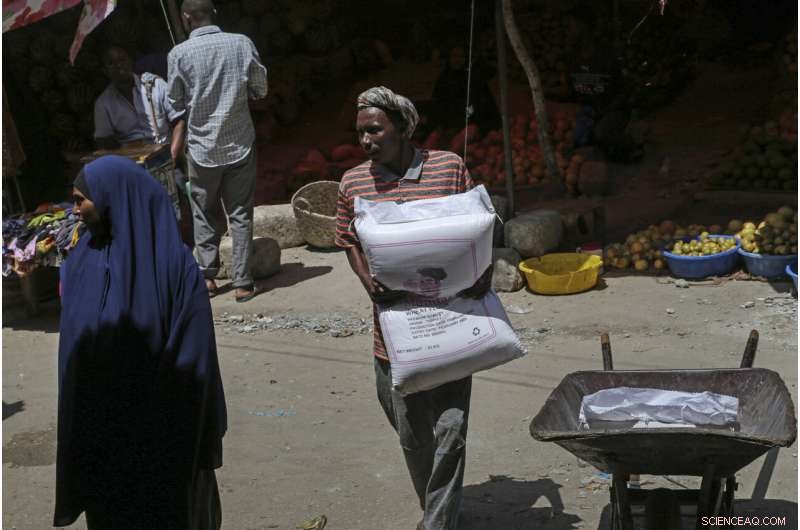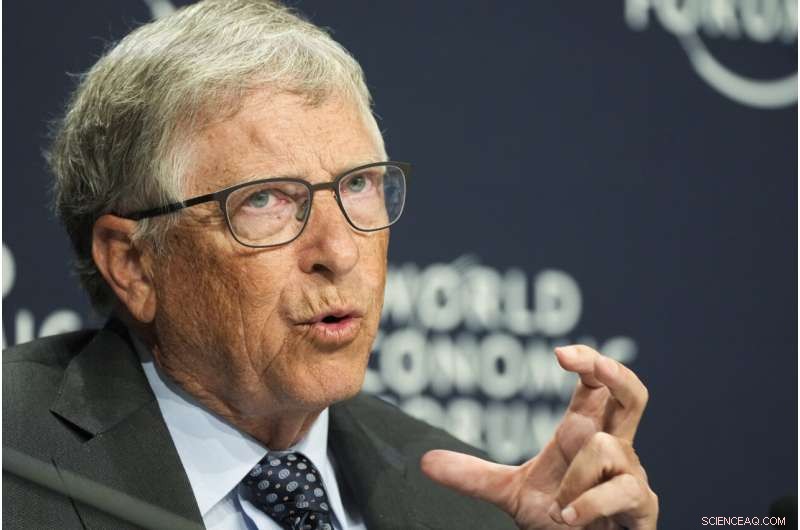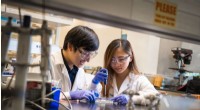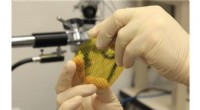Bill Gates:Teknologisk innovation ville hjælpe med at løse sult

En mand bærer en sæk hvedemel importeret fra Tyrkiet på Hamar-Weyne-markedet i hovedstaden Mogadishu, Somalia, torsdag den 26. maj 2022. Bill Gates opfordrede verdensledere til ikke at give op på de mål, de satte for at reducere sult og fattigdom på trods af enorme nylige tilbageslag dokumenteret i en ny rapport udgivet tirsdag den 13. september af The Bill and Melinda Gates Foundation. Kredit:AP Photo/Farah Abdi Warsameh, Fil
Bill Gates siger, at den globale sultkrise er så enorm, at fødevarehjælp ikke kan løse problemet fuldt ud. Hvad der også er nødvendigt, hævder Gates, er den slags innovationer inden for landbrugsteknologi, som han længe har finansieret for at forsøge at vende krisen, der er dokumenteret i en rapport, der blev udgivet tirsdag af The Bill og Melinda Gates Foundation.
Gates peger især på et gennembrud, han kalder "magiske frø", afgrøder, der er udviklet til at tilpasse sig klimaændringer og modstå skadedyr i landbruget. Gates Foundation udgav tirsdag også et kort, der modellerer, hvordan klimaændringer sandsynligvis vil påvirke vækstbetingelserne for afgrøder i forskellige lande for at fremhæve det presserende behov for handling.
Ved at tildele teknologi en fremtrædende rolle i håndteringen af verdens fødevarekrise, sætter Gates sig selv på kant med kritikere, der siger, at hans ideer er i konflikt med verdensomspændende bestræbelser på at beskytte miljøet. De bemærker, at sådanne frø generelt har brug for pesticider og fossilt brændstofbaseret gødning for at vokse.
Kritikere hævder også, at Gates' tilgang ikke adresserer krisens hastende karakter. Det tager år at udvikle "magiske frø" og vil ikke umiddelbart levere nødhjælp til lande, der i øjeblikket lider udbredt, fordi de er afhængige af fødevareimport eller oplever historisk tørke.
Det er en debat, der kan intensivere det internationale pres for at opfylde de fælles mål for global velstand og fred, kendt som FN's mål for bæredygtig udvikling, inden en 2030-deadline. De 17 mål omfatter udryddelse af fattigdom og sult, bekæmpelse af klimaændringer, adgang til rent vand, arbejde hen imod ligestilling mellem kønnene og reduktion af økonomisk ulighed.
"Det er ret dystert i forhold til vores håb for 2030," sagde Gates, 66, i et interview med The Associated Press. Han tilføjede dog:"Jeg er optimistisk, at vi kan komme tilbage på sporet."
Gates pegede på krigen i Ukraine og pandemien som hovedårsagerne til den forværrede sultkrise. Men hans budskab til andre donorer og verdensledere, der samles til FN's generalforsamling i september, er, at fødevarehjælp ikke vil være nok.
"Det er godt, at folk vil forhindre, at deres medmennesker sulter, når konflikter som Ukraine afbryder fødevareforsyningen," skriver Gates i den nye rapport. Men det virkelige problem, siger han, er, at mange fødevareusikre lande ikke producerer nok af deres egen mad – et problem, der helt sikkert vil blive forværret af konsekvenserne af klimaændringer.
"Temperaturen bliver ved med at stige," sagde Gates. "Der er ingen måde, uden innovation, at komme i nærheden af at brødføde Afrika. Jeg mener, det virker bare ikke."
Som han har gjort i mere end 15 år, opfordrede Gates til investeringer i landbrugsforskning og fremhævede majsfrø, der trives ved højere temperaturer og under tørrere forhold end andre sorter. Disse frø blev udviklet under et program fra African Agricultural Technology Foundation, som fonden har givet $131 millioner til siden 2008.
Siden da har Gates Foundation brugt 1,5 milliarder dollars på tilskud fokuseret på landbrug i Afrika, ifølge Candid, en nonprofitorganisation, der forsker i filantropiske gaver. Bill og Melinda Gates Foundation er efter nogle mål den største private fond i verden og er bedst kendt for sit arbejde med global sundhed, herunder vacciner. Det begyndte i sin nuværende form i 2000, efter at Gates forlod sin CEO-stilling hos Microsoft, den teknologigigant han var med til at stifte. Forbes anslår hans nettoformue til at være omkring 129 milliarder dollars.
Fondens udgifter til landbrugsudvikling er grunden til, at Gates' syn på, hvordan lande bør reagere på fødevareusikkerhed, har fået øget betydning i et år, hvor rekordhøje 345 millioner mennesker rundt om i verden er akut sultne. The World Food Program said in July that tally represents an increase of 25% from before Russia invaded Ukraine in February and a 150% jump from before the pandemic struck in the spring of 2020.
In Ghana, field trials for four varieties of modified seeds began in 2013. But only this past summer has one been approved for commercialization, said Joeva Rock of the University of Cambridge. Activists there, she said, have asked whether those resources could have been better spent elsewhere.
"What would happen if those went into increasing funds to the national research centers in Ghana, to building roads, to building storage, to building silos or helping to build markets?" said Rock, who has written a book about food sovereignty in the country.
When asked, Gates acknowledged the importance of infrastructure like roads and other transportation systems.
"If you want your inputs like fertilizer to come in, if you want your output to go out, it's just too expensive in Africa without that infrastructure," he said, adding that building and maintaining roads is highly expensive.

Bill Gates, Co-Chair, Bill &Melinda Gates Foundation, speaks at a news conference during the World Economic Forum in Davos, Switzerland, Wednesday, May 25, 2022. Gates urged world leaders not to give up on the goals they set to reduce hunger and poverty despite huge recent setbacks documented in a new report released Tuesday, Sept. 13 by The Bill and Melinda Gates Foundation. Credit:AP Photo/Markus Schreiber, File
Some researchers question the wisdom of pursuing the fundamental premise that Gates has embraced:Increasing agricultural production through the use of modified seeds along with fertilizers and pesticides. They point to the environmental footprint of industrial agriculture, including the use of fossil fuel-based fertilizers, the degradation of soil quality and the diminishing of biodiversity.
Alternatives could include agroecological interventions, like developing locally managed seed banks, composting systems to promote soil health and pesticide interventions that don't rely on chemicals, experts said. Over time, those approaches can reduce the need for food aid and build more resilient farming systems, according to Rachel Bezner Kerr, a professor of global development at Cornell University.
Kerr, a lead author of the food chapter of the latest report from the International Panel on Climate Change, said that while the panel doesn't make recommendations, "overall, the kind of focus on a few technologies and reliance on fossil fuel-based inputs isn't in line with ecosystem-based adaptation" or a biodiverse future.
Mark Suzman, CEO of the Gates Foundation, defends its approach warning that limiting access to fertilizers means farmers cannot increase their yields.
"Fertilizer is necessary. You simply cannot meet the overall productivity gains without it," Suzman said, speaking on a call with reporters.
In his interview with the AP, Gates himself dismissed criticisms of the foundation's emphasis on modified seeds.
"If there's some non-innovation solution, you know, like singing 'Kumbaya,' I'll put money behind it," Gates said. "But if you don't have those seeds, the numbers just don't work." He added, "If somebody says we're ignoring some solution, I don't think they're looking at what we're doing."
Another project the foundation has funded is the development of computer models that try to measure crop loss caused by disease or pests. The idea is to direct research and responses to where they are needed most.
"It's not just, how do we get through this crisis and get back to normal? It's, what does the future normal look like?" said Cambria Finegold, the director of digital development for CABI, an intergovernmental nonprofit that is developing the models.
Melinda French Gates, the other co-chair of the Gates Foundation, highlighted in a separate letter the halting progress toward gender equity worldwide. Since January, the foundation has expanded its board, adding six new members to help direct its work, a move that followed the announcement of the Gateses' divorce last summer.
French Gates has agreed to step down after two years if the two decided they could not continue to work together. French Gates, who also founded an investment organization called Pivotal Ventures, was not available for an interview.
Gates said he is lucky that his former wife has continued to put her time and energy into the foundation. In July, Gates said he would contribute $20 billion to the foundation in response to the significant setbacks caused by the pandemic, raising its endowment to approximately $70 billion.
Through his giving, investments and public speaking, Gates has held the spotlight in recent years, especially on the topics of vaccines and climate change. But he has also been the subject of conspiracy theories that play off his role as a developer of new technologies and his place among the highest echelons of the wealthy and powerful.
Gates said he does not spend time thinking about conspiracies and that his foundation's work has nothing to do with his personal reputation.
"If you go into these countries, they've never heard of me or the foundation," Gates said. "Maybe in the rich world somebody is reading some internet thing, but the people we care about have never, will never, and it's not important that they ever know who I am." + Udforsk yderligere
Gates:Foundation to invest $5B in Africa over next 5 years
© 2022 The Associated Press. Alle rettigheder forbeholdes. Dette materiale må ikke offentliggøres, udsendes, omskrives eller videredistribueres uden tilladelse.
 Varme artikler
Varme artikler
-
 Let at bruge 3-D bioprint-teknik skaber naturtro væv fra naturlige materialer(L-R):Bioingeniørstuderende Michael Hu og bachelorstuderende Xin Yi (Linda) Lei konstruerer en vaskulariseret tarmmodel ved hjælp af deres teams nye 3D-bioprintteknik. Kredit:UC San Diego Jacobs Schoo
Let at bruge 3-D bioprint-teknik skaber naturtro væv fra naturlige materialer(L-R):Bioingeniørstuderende Michael Hu og bachelorstuderende Xin Yi (Linda) Lei konstruerer en vaskulariseret tarmmodel ved hjælp af deres teams nye 3D-bioprintteknik. Kredit:UC San Diego Jacobs Schoo -
 Udarbejdelse af bedre vejledninger til medicinsk billedanalyseMed deres model, forskere var i stand til at generere on-demand hjernescanningsskabeloner i forskellige aldre (billedet), der kan bruges i medicinsk billedanalyse til at guide sygdomsdiagnose. Kredit:
Udarbejdelse af bedre vejledninger til medicinsk billedanalyseMed deres model, forskere var i stand til at generere on-demand hjernescanningsskabeloner i forskellige aldre (billedet), der kan bruges i medicinsk billedanalyse til at guide sygdomsdiagnose. Kredit: -
 Behåret robotSmart hudteknologi. Kredit:University of Texas i Arlington University of Texas i Arlington har patenteret en smart hud, skabt af en UTA-forsker, det vil give robotter mere følsomme taktile følelse
Behåret robotSmart hudteknologi. Kredit:University of Texas i Arlington University of Texas i Arlington har patenteret en smart hud, skabt af en UTA-forsker, det vil give robotter mere følsomme taktile følelse -
 Google trækker sig tilbage efter mordsag i New ZealandGoogle havde nægtet at stramme udgivelsesstandarderne efter at have udsendt en nyhedsmail til offentlige abonnenter i december, der navngav en anklaget morder i strid med en retskendelse Google in
Google trækker sig tilbage efter mordsag i New ZealandGoogle havde nægtet at stramme udgivelsesstandarderne efter at have udsendt en nyhedsmail til offentlige abonnenter i december, der navngav en anklaget morder i strid med en retskendelse Google in
- Kokosnødforvirring afslører forbrugernes gåde
- Hvornår lærte mennesker først at tælle?
- Regulering af CO2 i kroppen
- Forskere udvikler smarte sensorer til at forhindre strømafbrydelser
- Forskning bekræfter, at opvarmning kan øge styrken af en type hydrogel
- Månen lyser klarere end solen på billeder fra NASAs Fermi


